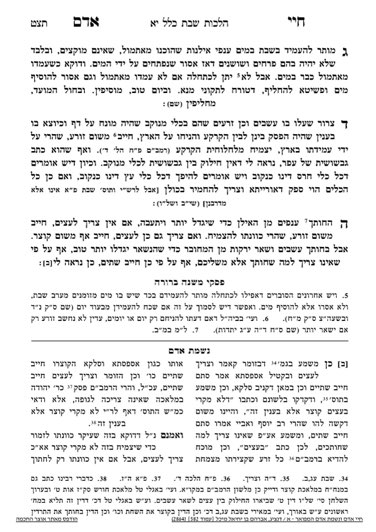Sponsorships for the upcoming Klalim, which discuss the 39 melachos of Shabbos, are available. Please contact Rabbi Reingold for more information at rabbireingold@gmail.com or 301.996.5910
We are continuing in siman 5, where the Chayei Adam introduced the concept that a person can perform one action and be chayav for two melachos, such as pruning a tree and being chayav for kotzair and zoreiah.
The Chayei Adam continues, and writes that when it comes to weeding a field or removing some plants from a patch which has too much growth the purpose is to help the plants grow. Nevertheless, even though one may not have any interest or intent for the plants, one will still be chayav for both zoreiah and kotzair.
The difference between this case and the previous case of pruning a tree is discussed in Tosfos in Sanhedrin (26a) and explained by the Maharsha. Tosfos discusses this question in terms of shemitah, in that if one gathers wood from a field for the purpose of helping the plants grow, it is assur on shemitah. The Gemara brings a story of a person who was caught cutting and gathering wood from a field, but he defended himself saying that he needed the wood for binding something.
Tosfos explains (based on the Maharsha’s understanding) that the issur under discussion in the Gemara is zoreiah, and there was never a thought that there should be a problem of kotzair when it comes to branches. Kotzair only applies to plant vegetation in regard to shemitah, and it would also be true in regards to Shabbos, where it not for the concept of meleches machsheves that converts tree pruning to Kotzair through the concept of meleches machsheves. Obviously, that will only be true when one has intent. Thus kotzair of plants does not require intent, while kotzair of tree branches does. .
What is still questionable, is why isn’t this case (where he has no intent to use the plants which are removed ) only assur and not chayav because of kotzair as it is a melacha sheaino tzricha lgufa. Obviously, he will be chayav for zoreiah.
The Chayei Adam concludes that in such a case, one will be chayav both for kotzair and zoreiah. We will leave this as a question, and will discuss it further when we learn the melacha of kotzair, be’ezras Hashem.
Summary
- If one prunes a tree for the purpose of helping the tree grow, they will only be chayav for zoreiah (even according to the opinion that melacha she’eina tzeicha legufa is chayav).
- If one prunes a tree for the dual purposes of helping the tree grow and for benefitting from the branches, their one action will make them chayav for both zoreiah and kotzair.
- When it comes to weeding a field or removing extra plants from a patch which has too much growth, one will be chayav both for zoreiah and kotzair even if they had no interest in the removed plants.



